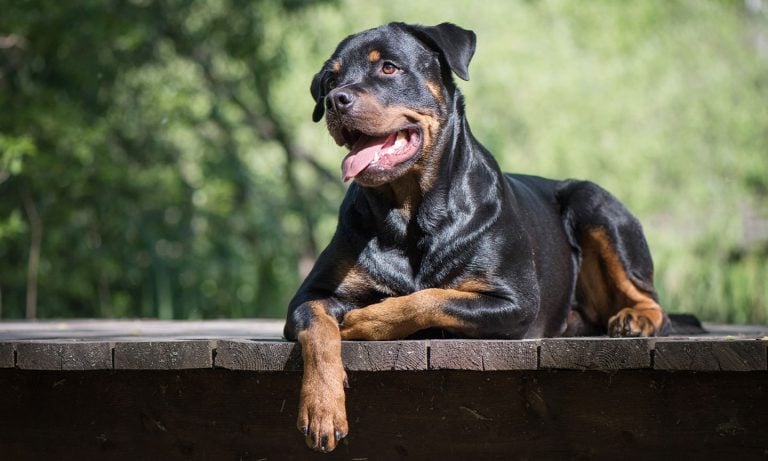Labrador Retriever vs Rottweiler

Breed Snapshot
Best For
The Labrador Retriever is one of the most popular dog breeds in America, known for their friendliness, intelligence and outgoing nature. These high-energy, athletic dogs require ample exercise and thrive in active households.
Labrador Retriever Temperament
Cheerful and animated, this large dog breed has stamina and energy to spare, able to keep up with your family and all your activities. You’ll want to funnel that energy into positive outlets, like outdoor activities and training. And thanks to their high intelligence, learning commands and tricks com...
Cheerful and animated, this large dog breed has stamina and energy to spare, able to keep up with your family and all your activities. You’ll want to funnel that energy into positive outlets, like outdoor activities and training. And thanks to their high intelligence, learning commands and tricks come relativity easy for them. Labrador dogs love having a job to do and excel at things like agility courses and, just like their name implies, retrieving items. In fact, their superior intelligence is why they often make great assistance dogs, working as therapy or service animals.
A people-pleaser, Labrador Retrievers have a pleasant personality and love interacting with humans. Get ready to be showered with lots of affection! They also easily make friends with dogs and other animals, including cats, although not all cats are as excited to meet them as they are—a Lab’s large size and high energy level can be a bit intimidating. Slow and controlled introductions to other family pets will help make the transition go smoothly. Considering the staying power of the Labrador dog breed’s popularity, it’s a safe bet your Lab will fit right in with the all the loved ones you choose to introduce into their life.
While they’re generally good-natured, like any dog breed, Labs may develop aggressive tendencies if they don’t receive proper training or have experienced abuse. Addressing any biting issues early on, providing proper socialization when they are puppies (aka safely exposing them to lots of new people, places and things) and working with a professional dog trainer can help avoid behavioral issues when they get older.
Labrador Retriever Traits

Breed Snapshot
Best For
A popular working breed, Rottweilers do best with experienced pet parents who can provide early training and socialization. These robust, large-sized dogs thrive in homes with active individuals or families, appreciating both mental and physical...
A popular working breed, Rottweilers do best with experienced pet parents who can provide early training and socialization. These robust, large-sized dogs thrive in homes with active individuals or families, appreciating both mental and physical challenges.
Rottweiler Temperament
Rottweilers are powerful and intelligent dogs who benefit from early training and socialization. They are easy to train and eager to please their families, but are also strong-willed and may seem aloof to the outside world. Originally descending from the mastiffs of the Roman legions, Rottweilers have been valuable...
Rottweilers are powerful and intelligent dogs who benefit from early training and socialization. They are easy to train and eager to please their families, but are also strong-willed and may seem aloof to the outside world.
Originally descending from the mastiffs of the Roman legions, Rottweilers have been valuable companion animals and working dogs for centuries. This is just as true today as it was years ago—families that are willing to put in the time to train and socialize their Rottweiler will be rewarded with an intensely loyal and energetic dog.
In fact, Rottweilers are much more emotionally needy than many people assume. This dog has a fearsome reputation, but in reality, Rottweilers are obsessed with their people and want to be around them all the time. Rottweilers who are isolated from people or kept alone may begin to exhibit unwanted behaviors when they do finally get access to people.
Rottweilers were originally bred to be protectors. Combined with their great strength, this makes it especially important that Rottweilers are properly trained and socialized. Once socialized, Rottweilers can easily get along with other dogs and young children. Like any dog, Rottweilers who are poorly trained, subjected to harsh discipline, or isolated are more likely to exhibit unwanted fear-based behaviors, including biting and aggression.
One especially interesting features of these dogs is their vocalization. Rottweilers aren’t known for excessive barking (although of course they can and will bark), but they do have a deep rumble that sounds almost like a growl. Some pet parents think of this rumbling sound as “talking.” This “Rottie rumbling” is almost like the purring of a giant cat and often means your Rottweiler is happy and content, particularly during belly rubs.




